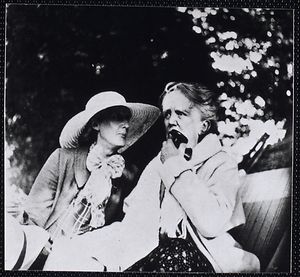I'm here at the moment--here being a place much visited by German raiders. Its odd, rather satisfactory, how soon one gets accustomed, at least to their neighborhood, and the sound of a bomb or two dropping over Brighton. If they dropped in the garden, doubtless this facade would break; and out would tumble a coward.
I wish I hadn't let a whole week of incessant human voices--London last week--come between me and your book. However, it survives; and in answer to your question, about sequacious (a word Coleridge uses) it means connected; and I used it to indicate a quality of currency, flowingness, in this book, which, though I didn't find it so crested and high stomached, as some of yours I liked. For so the characters come together more subtly: thats I think why I grasped H B more firmly this time. He was too quiet and many tinted to survive the abandonment--emphasis of the other books. Here you let him grow. I never agree that one book is "the best." Unless of course one's Shakespeare--and how few of us are!--I believe every book is only a fragment; and one may be a brighter or bigger fragment; but to complete the whole one must read them all. Certainly you got things said in this one that you didn't in Imp [Impressions That Remained 1919]: and t'other way about. Thats, partly, why I want you to continue. Because you do continue, thank God, not a finished precious vase, but a porous receptacle that sags slightly, swells slightly, but goes on soaking up the dew, the rain, the shine, and whatever else falls upon the earth. Isn't that the point of being Ethel Smyth? Now Vernon Lee, I daresay, completed her shape, and was sun dried and shell like. Well, I musn't run on inordinately.
No, I shan't send you R.F. [her biography of Roger Fry]: because, dear Ethel, its no more your book than Maurice Baring was mine. And I don't like to think of you rubbing your spectacles and screwing up your forehead. No, let it lapse; and one of these days I'll write something you'll take to like a duck: or so I hope. I cant say what I'm doing next week: alls a vast leap in the dark. So I'll leave it to the moment and the telephone, as before.
Now its clouding over: is there time for a game of bowls? Thats my passion.
V.
Woolf and Smyth had a complicated relationship, Woolf betraying in her creative work little of the ego that Smyth did.

Woolf's "Thoughts on Peace in an Air Raid" (August 1940), written for an American audience while in the same mood of futility and frustration with a political situation she is powerless to influence, ends with plaintive urgency:
Let us send these fragmentary notes to the huntsmen who are up in America, to the men and women whose sleep has not yet been broken by machine–gun fire, in the belief that they will rethink them generously and charitably, perhaps shape them into something serviceable.
No comments:
Post a Comment